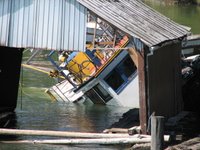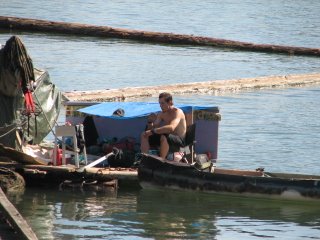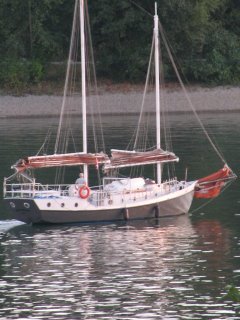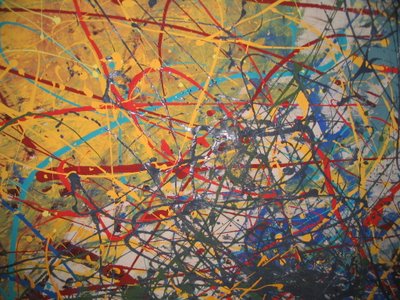The Maple Ridge NEWS once published a column called 'Radio Free Haney'. Radio Haney the blog comments on issues and events here in the District of Maple Ridge. The historical Haney neighourhood is so named after early settler Thomas Haney.
Thursday, November 30, 2006
AND THEN I WOKE UP.
"Iraqi forces 'ready by mid-2007'
Mr Maliki said training of Iraqi forces will be stepped upIraqi Prime Minister Nouri Maliki has said Iraqi forces will be ready to assume security control of the country in June 2007.
"Iraqi forces will be... fully ready to receive this command," Mr Maliki said in an interview with US ABC TV, to be aired later on Thursday.
He was speaking hours after holding talks with US President George W Bush in the Jordanian capital, Amman.
Mr Bush has said US troops will remain in Iraq "until the job is complete".
The president said after their meeting that it was important to speed up training for the Iraqi security forces."
Seems Bush and Maliki smoked more than cigars after the dinner they didn't have. The show rolls on.
Wednesday, November 29, 2006
What we learned today.
There is a certain arrogance attached to the notion that once be elected - even twice - one can calmly set about changing the way things are done half way around the world.
What we learned today is that world leaders need to think a lot deeper before opening their mouths, let alone acting on their thoughts.
Can it get any more complicated than it already is? Probably.
The peoples of the US deserve our sympathy, but with each passsing hour their elected officials make it harder and harder for the US to find a shoulder to cry on. What to do, what to do?
Tuesday, November 28, 2006
Crude but to the point - 2010 World Cup opinion.
"LISTEN BROTHER
PLEASE GET THIS OUT TO RELAVANT FOLK, FIFA IF YOU CAN
I CANNOT BELIEVE THAT THEY ARE STILL WANTING TO HOST 2010 IN S.A.
THE ARGUEMENT IS STILL ON WHERE TO BUILD THE GREEN POINT STADIUM , SPENDING BILLIONS FOR ONE MATCH
WE HAVE THE POOR NEEDING HOUSING, WATER AND ELECTRICITY
WE HAVE A JUSTICE SYSTEM WHEREBY THE CRIMINALS HAVE ALL THE RIGHTS AND THE VICTIMS ZILCH
LAST WEEK A FATHER SODOMIZED HIS 3MNTH OLD CHILD AND IS OUT ON BAIL....HALOOOOOOO
CRIME IS SOOO HIGH HERE, AND BELIEVE ME THIS IS ONLY THE PRACTISE RUN FOR THECRIMINALS, THE REAL SHIT WILL HAPPEN IN 2010
WE HAVE A NON EXISITANT TRANSPORT SYSTEM
THE HOSPITALS ARE COLLAPSING
THERE IS NO INFRASTRUCTURE
WHY ON EARTH DO ALL THESE PEOPLE WANT TO COME HERE TO BE FED INTO A LIONS DEN AND CHOMPED,
PRAY IT DOES GO TO AUSSIE AND HERE MONEY GETS USED INSTEAD TO HOUSE THE POOR AND GET THE COUNTRY BACK TO NORMALITY AND DO SOMETHING ABOUT THE CRIME......WHICH IS ESCALATING OUT OF CONTROL
I CANNOT BELIEVE THEY THINK WE CAN DO IT
WHAT YA THINK
JAXSON"
Define national recognition
Moreover, how does Quebec stack up against accepted definitions of the word 'nation'?
na·tion (nā'shun) n.
A relatively large group of people organized under a single, usually independent government; a country.
The territory occupied by such a group of people: All across the nation, people are voting their representatives out.
The government of a sovereign state.
A people who share common customs, origins, history, and frequently language; a nationality: “Historically the Ukrainians are an ancient nation which has persisted and survived through terrible calamity” (Robert Conquest).
A federation or tribe, especially one composed of Native Americans.
The territory occupied by such a federation or tribe.
[Middle English nacioun, from Old French nation, from Latin nātiō, nātiōn-, from nātus, past participle of nāscī, to be born.]
Often described as a bright fellow one can assume that Harper did his homework on this subject. A cynical response to his proposal will be that this move is simply an act of mischief designed to propel the nation - that would be Canada - into a debate over nothing. Clearly (or even vaguely) Canada comprises many nations from the First to the Last to many in between.
And within these nations we find so many cultures and religions and groups from which we draw that unique blend that defines us a peculiarly "Canadian". Recognize one nation and we recognize all nations; not a bad thing. The difference between the national Quebequois is that they are defined by another element which the other nations do not have; a border. The nations of Denmark, Spain, Scotland, England, Italy, Estonia, Germany within this sovereignty may think of the French as having the upper hand. The First Nations for their part have many borders across Canada and throughout the territories and provinces. They seem quite content for Quebec to have its nationhood. Will they feel the same when the next logical steps follow towards becoming an 'independent nation'?
Hopefully the nation debate will fade as more imporant issues fill the dance card. Smoke and mirrors will only keep the Conservatives in power for so long, but this attempt was not bad, perhaps rating an 8 out of 10 in the BS scale. Canadians, all Canadians, will soon see that they have been duped by being tossed a shallow attempt at diversion.
Sunday, November 26, 2006
Friday, November 24, 2006
Would the honourable member kindly repeat that.
Monday, November 20, 2006
Will the new-new order 'go local?'
This week it appears that the first steps towards such a proposal may indeed already have been taken. Success or failure will revolve around trust. Trust, in a region where trust has long been in short supply. The removal of Saddam Hussein and his followers, while an admirable feat has also meant the unleashing of hard line forces within the Sunni and Shia factions. If by some miracle the leadership in Iran and Syria manages to heal the deep wounds that exist between these two powerful groups in the region, then the the foundations will be laid for a larger peace. Sadly for the US-backed coalition such a proposal, if it were to succeed, would highlight the failure of the US foreign policy in the mid-east and would further go some way towards reducing US influence over oil supplies emanating from the region.
The BBC says in a report on November 21 2006:"Syria and Iraq are to restore diplomatic relations, after a break of more than 20 years.
Agreement on restoring all diplomatic ties was announced in Baghdad by Foreign Minister Hoshyar Zebari and his Syrian counterpart Walid Muallim.
Correspondents say Iraq hopes the move will help to stem a flow of militants across the border with Syria.
Relations were severed in 1982, during Saddam Hussein's rule and soon after the beginning of the Iran-Iraq war." From this report one may gather that the Bush administration has achieved at unwillingly what could be considered a diplomatic victory if by its aggressions it has driven the Syrians and Iraqis to the negotiating table. Iran is surely not far behind.
Just the day before on Monday 19 2006 CNN reported that the special Committee on Iraq - a committee struck in the wake of the Democrats retaking of Congress - has come up with three options. Go long, go big or go home. In its wisdom and in keeping with its national instinct it never occurred to the committee, or for that matter to the Whithouse, that 'go local' presents as much as an attractive option as the three military options offered by the US.
Go local under the auspices of Syria and Iran faces the same challenges as the coalition faces today. The key difference is that Iran and Syria do not (other than in the eyes of the Whitehouse) face a credibility challenge. Credibility, or its lack, seems to the Achilles heel of the Bush administration wherever it shows up, moreso as it enters the second half of its term.
Attempts by Iran, Syria and Iraq to buddy up should in any event be viewed as positive by the international community and in particular the UN. Any attempt, whether coalition driven or locally driven, should be viewed with admiration. However, the response that will come from the Bush administration and its supporters will be sadly predictable. For Iran and Syria to succeed where the US has failed would be as about unpalatable an outcome as the west could imagine.
What remains to be seen is whether Iran and Syria have the combined intellectual capacity to comprehend the opportunity and ride the irony of a local peace to the finish line. Critical of course will be creation of stable relations between Shia, Sunni and Kurd. Oddly, partitioning may be the resultant and defining characteristic of the solution. A famously colonial instrument, partitioning may seem an odd choice in this new era, but quite often unity is preceded by dividing. And peace inevitably is preceded by war.
Friday, November 17, 2006
Sunday, November 12, 2006
Thursday, November 09, 2006
Fall on the Fraser River near Port Haney

Think on this bretheren.
Missing in action.
I have this image of them huddled in a bunker, vial of arsenic at the ready.
Wednesday, November 08, 2006
Democracy, war and irony.
With the sole aim of bringing democracy to Iraq war does, in retrospect, seem an odd way for the proponents of democracy to demonstrate their good intentions. With yesterday’s mid-term elections taking down the Republicans in both houses one wonders if this event itself would not adequately demonstrate that, in the right hands, democracy does indeed work.
The fall of Republicans yesterday was followed closely by today’s announcement of Donald Rumsfeld’s resignation. Of itself the Rumsfeld departure comes as not a surprise to anyone, and if anything is seen as a blessing by many. It is as clear today as it was all along that Rumsfeld did nothing but ‘follow orders’ and no one is in doubt as to where the orders found birth. The war, now more than ever, seems to have been and continues to be an appalling waste of human life. The economic loss is irrelevant, for it is a matter of morbid statistics, that the US economy seems to thrive as much in peace as it does in war.
This week too saw one Dictator condemned to death while a Decider has been democratically condemned to a slow and arduous 2 year death as he serves out his time in virtual political purgatory in Washington. So with the protagonists gone and foot soldiers fired what should we expect next? The future is by no means certain.
We (and none of us in the West should deny that we were implicitly involved) went to war in the hope of bringing Democracy to Iraq. We have failed. The way in which we chose to register our failure was to pressurize the US electorate into removing the first problem – a Republican dominance in Congress – and we will continue to fight for the removal of Republican influence altogether in the Whitehouse.
The irony lost is that the citizens of the US, by their actions at the polls this week have more successfully demonstrated the virtues of democracy than any invasion or war ever will. Sadder yet is that this irony is lost where it is most needed, in the Middle East and in Iraq more than ever.
Sunday, November 05, 2006
Friday, November 03, 2006
A word on the wind

Support for wind power picking up speed
POSTED: 11:50 a.m. EDT, October 9, 2006
var clickExpire = "-1";
By Gary NurenbergCNN
Adjust font size:
Wind advocates see modern turbines and wind farms as the metaphorical pot of gold at the end of the rainbow.
That would be a huge jump from the 1 percent of power wind generates this year, according to figures from the American Wind Energy Association (AWEA).
According to the U.S. Energy Information Administration, U.S. wind energy consumption more than doubled between 2000 and 2004, from 57 trillion Btus to 143 trillion.
As advocates urge the rapid construction of new wind farms, skeptics want a more cautious approach.
Plans to build a wind farm off Cape Cod, Massachusetts, have met with strong opposition from critics, who say the big wind turbines are ugly, kill birds and bats and damage property values.
"It's the proper siting and the proper review of these facilities," Linowes said. "And if we can see to it that that's happening, I think you would see opposition to wind drop off."
Wind has become an additional crop for Midwestern farmers who put turbines on their land and sell electricity to power companies.
Using wind, MOM's may pay 2 or 3 percent more for electricity now, but in a typical contract the price is fixed -- which customers say saves them money in the long run against fluctuating energy costs.
Similarly, Whole Foods Market decided in January to use wind for all of its power -- making the Austin, Texas-based supermarket chain the largest buyer of wind energy in the nation, according to Time magazine.
To do so, the companies buy "wind power credits" from Boulder, Colorado-based Renewable Choice Energy, which in turn pays wind farms across the country to produce electricity.
The credits and wind power created offset the actual energy the companies use. Individuals can sign up for similar plans.
"This industry has gone from a science project to something that is viable, on a utility scale, in the past five or 10 years," Steve Zwolinski, president of GE Wind Energy, told Fortune magazine last year.
Thursday, November 02, 2006
Wednesday, November 01, 2006
Emmission control, greenhouse gases, global warming, climate change and human conflict.
Several searches on Google and other search engines render few results on the subject. Here are a few sample questions that a researcher may consider.
Producing instruments of war:
- How much energy is consumed in the manufacture of, for instance, a Hummer, a tank, a smart bomb, an F-16, an aircraft carrier, a hand gun, a nuclear warhead? Make a list of all the instruments of war manufactured since, say 1900, as a starting point. Take the list and multiply it by the total number produced over the lifespan of the item. Add it all up and calculate the pollutants and gases produced as a result of the manufacturing process.
Using the instruments of war:
- How much energy was required to arm the instruments of war in terms of munitions?
- How much energy was used in getting the instruments of war to the battlefield? For instance, how much jet fuel, diesel and gasoline did it take to get the US forces to Iraq to begin with and how much has been consumed in ferrying the troops back and forth since the war began?
- Leave Iraq aside and ask the same questions with respect to all other conflicts currently underway? How much, say, did the Israeli bombing Lebanon this year contribute to global warming?
The long term effects of war:
- When Saddam Hussein decided to torch the oil fields at the time when the Iraqi forces retreated from their failed invasion on Kuwait the resultant fires and smoke hung like a vile smog over the planet earth, easily visible from space; do we know, or will we ever know how this impacted sustainability of life on earth?
- Each small explosion is a pollutant; how does the grand total of all explosions since 1900 register on the climate change scale?
While the Kyoto agreement is well-meant it comes nowhere close to seriously addressing the issue of climate change. The fact that certain developed countries choose to ignore even this miniscule attempt at correcting the direction in which we are headed, is astounding. Far from being a step in the right direction, Kyoto is nothing more than a glance in the right direction.
While international aid agencies undertake a variety of missions and good work to save helpless communities in one corner of the globe or another, our leaders from every side of the political spectrum continue to fail us utterly by ignoring the larger issue which asks a simple question: do we have any interest at all in perpetuating life on earth?














